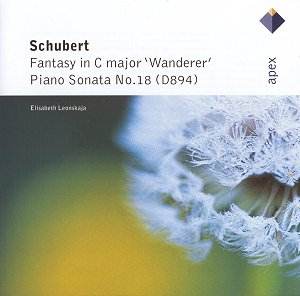 Composer: Wolfgang Amadeus Mozart
Composer: Wolfgang Amadeus Mozart
Works: Piano Sonata No. 1 in C major, K. 279; Piano Sonata No. 2 in F major, K. 280; Piano Sonata No. 3 in B flat major, K. 281; Piano Sonata No. 4 in E flat major, K. 282; Piano Sonata No. 5 in G major, K. 283; Piano Sonata No. 6 in D major, K. 284/205b; Piano Sonata No. 7 in C major, K. 309; Piano Sonata No. 8 in A minor, K. 310; Piano Sonata No. 9 in D major, K. 311; Piano Sonata No. 10 in C major, K. 330; Piano Sonata No. 11 in A major (“Alla Turca”) K. 331; Piano Sonata No. 12 in F major, K. 332; Piano Sonata No. 13 in B flat major, K. 333; Fantasia for piano in C minor, K. 475; Piano Sonata No. 14 in C minor, K. 457; Piano Sonata No. 15 in C major (“Sonata semplice”) K. 545; Piano Sonata No. 16 in B flat major, K. 570; Piano Sonata No. 17 in D major (“Trumpet”, “Hunt”) K. 576; Piano Sonata No. 18 in F major, K. 533/494
Performers: Mitsuko Uchida, piano
Recording: Rec: 1983 – 1987, Henry Wood Hall, London
Label: PHILIPS
Mozart’s piano sonatas represent a vital intersection of classical form and expressive depth, a testament to the composer’s innovative genius during the late 18th century. With their intricate interplay of melody and harmony, these works not only showcase Mozart’s evolving compositional style but also reflect the cultural milieu of the Enlightenment. This five-CD set, expertly performed by Mitsuko Uchida, encapsulates the entirety of Mozart’s piano sonatas and includes the poignant Fantasia in C minor. Uchida’s interpretations breathe fresh life into these familiar pieces, presenting both their structural integrity and emotional resonance with remarkable clarity.
Uchida’s performance is characterized by a rare combination of finesse and sensitivity. From the very first notes of Sonata No. 1 in C major, K. 279, she establishes a delicate touch that allows the music’s natural buoyancy to shine through. The opening Allegro is marked by a playful spirit, with Uchida deftly navigating the work’s rapid passages while maintaining an airy lightness. In this, she exemplifies an interpretative choice that emphasizes Mozart’s inherent charm rather than mere technical display. The structural balance she achieves is particularly evident in the contrasting lyrical sections, where her nuanced dynamics breathe life into the melodic lines without overwhelming them with excess sentimentality.
Throughout the set, Uchida’s approach to phrasing is particularly noteworthy. In Sonata No. 8 in A minor, K. 310, for example, she captures the emotional turbulence of the second movement, an Adagio that unfolds with an almost operatic intensity. Here, Uchida’s use of rubato allows the music to breathe, creating a palpable tension that culminates in the subsequent Allegretto. This interpretative choice, which enhances the emotional arc of the sonata, demonstrates Uchida’s deep understanding of Mozart’s dramatic impulses, allowing the listener to experience the music in a compelling narrative context.
The technical aspects of Uchida’s playing are equally impressive. Her articulation is consistently precise, with each ornamentation serving to enhance the melodic fabric rather than distract from it. The Fantasia in C minor, K. 475, is a prime example of this, where Uchida’s intricate fingerwork reveals the complexity of the piece while maintaining an overarching sense of coherence. The recording’s engineering further complements her artistry; the clarity of sound captures the full range of the piano’s tonal palette without introducing any artificial reverberation, allowing the listener to engage intimately with Uchida’s interpretation.
Comparing this set to other notable recordings, such as those by Alfred Brendel or Maria João Pires, Uchida’s performances stand out for their humility and emotional restraint. Where others may indulge in flamboyant expressions, Uchida’s subtlety allows the listener to appreciate the intricate textures and subtleties of Mozart’s writing. Her commitment to serving the music rather than her own interpretative agenda resonates deeply, offering a fresh perspective on these well-trodden paths.
Mitsuko Uchida’s traversal of Mozart’s piano sonatas is a remarkable achievement that balances technical proficiency with profound musical insight. Each sonata and the accompanying Fantasia are presented with an artistry that respects the composer’s intentions while inviting the listener into a world of emotional depth and clarity. This set is not merely a collection of recordings; it is an essential exploration of Mozart’s genius as seen through the lens of one of today’s most insightful interpreters. For anyone seeking to deepen their appreciation of Mozart’s piano repertoire, this collection is indispensable.



